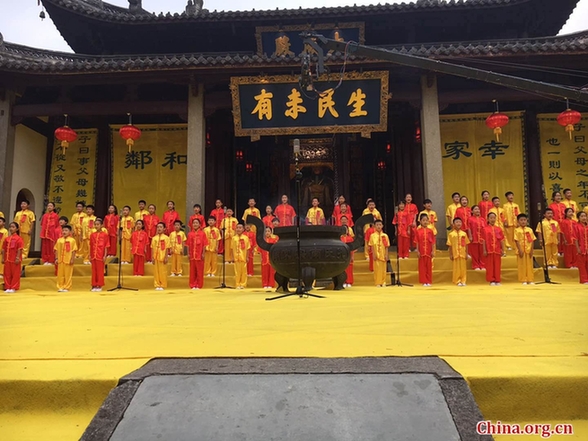A grand ceremony was held to mark the 2,568th anniversary of the birth of Confucius in Quzhou, Zhejiang Province, on Sept.28.
|
|
|
Quzhou, a city in Zhejiang Province in southeastern China, holds a grand memorial ceremony to mark the 2,568th anniversary of the birth of Confucius on Sept. 28, 2017. The ceremony includes tributes and recitals. Born in 551 B.C., the great philosopher and educator provided concepts that are considered a principle philosophy in China for more than 2,000 years, and are also admired internationally. [Photo/China.org.cn] |
Under the theme of “Happiness in the Family, Harmony with the Neighbors,” the ceremony received visitors from home and abroad at the Southern Confucius Ancestral Temple, one of the two temples in China belonging to direct decendents of Confucius.
The annual memorial ceremony held in Quzhou has been selected as a China Intangible Cultural Heriatage since 2011, and it calls on people to commemorate Confucius in the contemporary China.
“The Chinese people have since ancient times attached great importance to family. For over 800 years, Quzhou has carried on this traditon from age to age,” Kong Xingkai, director of the management committee of Quzhou Southern Confucius Ancestral Temple and the 75th generation in the lineal descent of Confucius, said in his speech.
Kong also spoke about the expanded influence of Confucianism. “The thoughts and values created by Confucius still carry a profound impact on Chinese people’s way of life today and are closely related to the contemporary development. Therefore we should call on more people to participate in these cultural activities.”
Since 2012, Quzhou has put in a couple years of dedicated efforts to build its cultural industry park in a bid to carry on Confucinism teachings and lead the local economic transformation and advancement.
As the only state-level cultural industry trial park in Zhejiang Province, Quzhou has built many cultural establishments aimed at carrying forward Chinese traditional culture by teaching visitors about Confucianism and allowing them to experience the cultures of Ming and Qing dynasties.
Follow this news feed: East Asia






